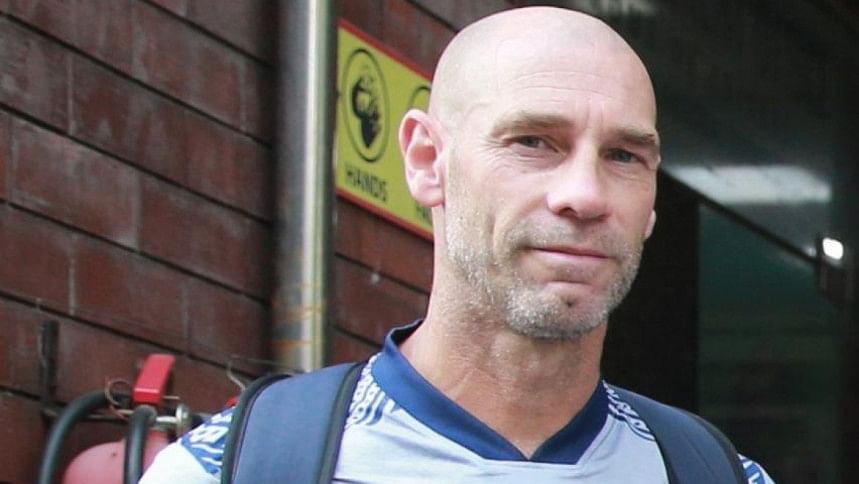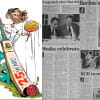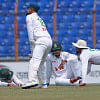'Managing swing key in Pakistan'

Before taking the role of High Performance (HP) head coach in May 2023, former Bermuda batter David Hemp worked as the head coach of the Pakistan national women's team between 2020 and 2022. Earlier this year, the 53-year-old was officially assigned to the Bangladesh men's national cricket team as their batting coach. Since then, he has worked with the Tigers in several bilateral and global tournaments, including the recently concluded T20 World Cup in the USA and West Indies. Bangladesh's next international engagement will be in Pakistan, where they will play two Tests, both part of the ICC Test Championship. Given Hemp's previous experience working in that part of the world, Bangladesh will have high expectations for his insights on the playing conditions there. On Monday, Hemp talked to The Daily Star's Samsul Arefin Khan over the phone from Australia on several aspects, including the team's preparation and chances for the series. The excerpts are as follows:
The Daily Star (DS): Bangladesh haven't played too many Tests in Pakistan over the years. How do you see the team's overall chances in this series?
David Hemp (DH): I think Pakistan are a strong side… and will be backing themselves to put up a good performance on home soil. It's not going to be an easy series in terms of conditions and surfaces. But traditionally, what we have seen over the last couple of years is that there have been good batting surfaces. It's conventional swing to start with and then reverse swing plays an important part in the game. But until we get there and see the conditions, because they might decide to leave grass on the wicket or it might be so much grass that the wicket might be suppressive [for batters], we aren't going to know about it.
DS: Pitches in Pakistan aren't like typical sub-continental ones, regularly assisting the pacers while some produce a lot of runs. What will be the biggest challenges for our batters in these types of surfaces?
DH: The key plan is managing conventional swing and then the reverse swing, and how we can assist the players to understand what they might come up against. If you look at the teams that had gone to Pakistan in the last couple of years, it's about occupying the crease for most of the time… so that you can bowl properly and set fields too. The matches had generally gone into the last day because they were very good for batting. For [taking] wickets, you have to work really hard but if you do get the ball swinging and reverse swinging, you have a really good chance to knock people over.
DS: Our HP team will be heading to Australia for two four-dayers while our A team will go to Pakistan prior to the Test series. Do you think our Test players should prepare with these matches too?
DH: I'm not sure what the selectors are going to do with the individuals… whether they can send them. As you have said, there are a couple of tours… so there's an opportunity to look at some players there, so that they can get used to the conditions.
DS: Bangladesh had a good start in this cycle of ICC Test Championship, beating New Zealand in their first game but derailed since. How do you see the team's position in terms of performance in this format?
DH: I think the win against New Zealand was very good. Apart from Glenn Phillips' innings in Dhaka, I believe we could have won that game as well. He played exceptionally well and was the difference between the two teams with the runs he scored in the second innings. Obviously, it was disappointing. We got ourselves into a winning position.
Regarding the Sri Lanka series in March, our focus was on batting for longer periods. Unfortunately, we couldn't achieve that. We failed to bat for over 50 overs in three innings. Our best batting performance was in the second Test, where we managed to bat for that extended period, forcing the opposition to change their approach during the innings. We need to ensure we occupy the crease for as long as possible. That means aiming to bat a minimum of 100 overs and assessing our position at that stage. It's a goal we should all strive for.
Another disappointing aspect of that series was missing a couple of opportunities against the Sri Lankan middle-order. If we had taken those chances, the result might have been different. From a batting perspective, you can't settle for batting just 50 overs in a Test match. We need to bat longer than that, and it's something we all need to focus on.
DS: Regarding our performance in the last T20 World Cup, how do you evaluate everything? People were disappointed after the team missed out on a golden opportunity of reaching the semis. Do you think if the team had shown more courage, they could've finished in the top four?
DH: I'm not sure if the word "courage" is right. We got ourselves into a position with an outside chance of getting to the semifinals. I think before the tournament, if anyone had said we would not only get into the Super Eight but also have an outside chance of reaching the semis, it would have been considered a pretty successful World Cup. I think people will understand the surfaces we played on. Throughout the World Cup in West Indies and the USA, some of the surfaces were challenging. Of course, it was disappointing not to get over the line against Afghanistan when we chased down the total. But it was a very tough challenge on a tricky surface. Ultimately, it was the most successful World Cup, perhaps the best World Cup Bangladesh has ever had. If you step back and say Bangladesh won three matches, lost one game by four runs, and another game by eight runs, then you see we were not far from winning five games of T20 cricket, which would have made for a very rewarding World Cup.
DS: But don't you think the batters should have batted better than what they showcased in the tournament?
DH: At the end of the day, we try to win games of cricket. You take the options that you feel are right at the particular time. What we found was that some of the best players in the world went into the World Cup and didn't perform at all. You have to understand where our batters were in that context and how challenging it was. It's not as simple as saying you can stand and hit through the line and hit balls over the top because some of the surfaces didn't allow us to do that. We are conducive to that type of play. The disappointment is that we know we have good players with high levels of skill, but they didn't show it consistently. That's the most disappointing thing, not the fact that people are looking to win the game. You also understand that T20 cricket is all about managing pressure, and one bad over can cost you the game. So, if you lose two wickets in the space of two overs, the game quickly changes or flips. We bear that in mind. But in terms of the outcome, getting to the Super Eight was the first goal that we achieved, and we weren't very far from getting into the semifinals.
DS: Bangladesh's Test side are quite different from the white-ball teams, although there are some players like Shanto and Liton who play in all three formats. How do you see their preparation for the series?
DH: In terms of preparation, we have some Test players who are in the white-ball squad. But those who aren't in the squad are preparing among themselves. With a couple of practice matches coming up, I think it will give them enough opportunities to prepare for the Test matches.
DS: Can you say something more specific about Shanto and Liton's form? One is the captain, and the other one is also a regular member of the squad.
DH: Obviously, they are having a bit of a break now. They will be participating in those practice games, so they will get the opportunity to get themselves mentally right for the longer version. That's the adjustment you have to make. It's about occupying the crease, making good decisions, and playing and leaving the ball, as there will be no scoreboard pressure. It's all about occupying the crease as long as they can.

 For all latest news, follow The Daily Star's Google News channel.
For all latest news, follow The Daily Star's Google News channel. 








Comments